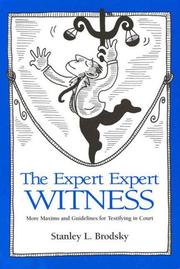| Listing 1 - 10 of 20 | << page >> |
Sort by
|
Book
ISBN: 1433840111 9781433836329 1433836327 Year: 2022 Publisher: Washington, D. C. : American Psychological Association,
Abstract | Keywords | Export | Availability | Bookmark
 Loading...
Loading...Choose an application
- Reference Manager
- EndNote
- RefWorks (Direct export to RefWorks)
The third edition of this classic resource provides mental health professionals with pithy, practical advice for testifying in court with the same wit and whimsy and a revamped structure.
Book
Year: 1973 Publisher: Urbana: University of Illinois press,
Abstract | Keywords | Export | Availability | Bookmark
 Loading...
Loading...Choose an application
- Reference Manager
- EndNote
- RefWorks (Direct export to RefWorks)
Book
Year: 1978 Publisher: Milano : Giuffrè,
Abstract | Keywords | Export | Availability | Bookmark
 Loading...
Loading...Choose an application
- Reference Manager
- EndNote
- RefWorks (Direct export to RefWorks)
Book
ISBN: 0669971707 Year: 1975 Publisher: Lexington (Mass.) : Lexington books,
Abstract | Keywords | Export | Availability | Bookmark
 Loading...
Loading...Choose an application
- Reference Manager
- EndNote
- RefWorks (Direct export to RefWorks)
Book
Year: 1972 Publisher: Marysville, Ohio American Association of Correctional Psychologists
Abstract | Keywords | Export | Availability | Bookmark
 Loading...
Loading...Choose an application
- Reference Manager
- EndNote
- RefWorks (Direct export to RefWorks)
Book
Year: 1972 Publisher: Marysville American association of correctional psychologists
Abstract | Keywords | Export | Availability | Bookmark
 Loading...
Loading...Choose an application
- Reference Manager
- EndNote
- RefWorks (Direct export to RefWorks)

ISBN: 1557985979 Year: 1999 Publisher: Washington (D.C.): American psychological association
Abstract | Keywords | Export | Availability | Bookmark
 Loading...
Loading...Choose an application
- Reference Manager
- EndNote
- RefWorks (Direct export to RefWorks)
Book
ISBN: 9781433812125 1433812126 Year: 2013 Publisher: Washington, DC : American Psychological Association,
Abstract | Keywords | Export | Availability | Bookmark
 Loading...
Loading...Choose an application
- Reference Manager
- EndNote
- RefWorks (Direct export to RefWorks)
Evidence, Expert --- Forensic psychology. --- Expertises. --- Psychologie légale.
Book
ISBN: 1433808714 9781433808708 1433808706 9781433808715 Year: 2011 Publisher: Washington, DC : American Psychological Association,
Abstract | Keywords | Export | Availability | Bookmark
 Loading...
Loading...Choose an application
- Reference Manager
- EndNote
- RefWorks (Direct export to RefWorks)
"This book examines the clinical dilemmas faced by therapists who, for a variety of reasons, are working with involuntary or reluctant clients. These individuals often come to therapy through the judicial system but might also be problem employees or spouses persuaded to enter therapy by their mates. Under these circumstances, working together can be frustrating for both therapist and client. The typical therapist's skills of reflecting, probing, and supporting often fail with individuals who did not enter into therapy of their own accord-or who, once there, do not engage readily with the therapist. The inquiring approach to therapy, with its frequent questioning of the client, can have an unwelcome and intrusive quality for poorly motivated clients. Stanley Brodsky demonstrates how therapists can tailor their interventions to avoid impasses, build a firm alliance with the client, and help him or her develop more productive behaviors. Specifically, Brodsky proposes that therapists adopt a variety of techniques that largely avoid asking questions. Instead, he shows how therapists can make assertive statements about what is happening in the client's life, identify behaviors, and describe choices the client might make. Through the use of case material, the author demonstrates that interacting creatively with reluctant clients can lead to significant breakthroughs. The provocative ideas in this book will be welcomed by therapists and counselors who work with offenders, probationers, involuntarily committed patients and, more broadly, other clients who fail to make progress"--Publicity materials. (PsycINFO Database Record (c) 2010 APA, all rights reserved).
Resistance (Psychoanalysis) --- Psychotherapist and patient. --- Patient refusal of treatment. --- Involuntary treatment. --- Medical personnel and patient. --- Psychotherapy --- Coercion --- Mandatory Programs --- Patient Compliance --- methods --- psychology --- Coercion. --- Mandatory Programs. --- Professional-Patient Relations. --- Résistance (psychanalyse) --- Patients --- Relations médecin-patient. --- methods. --- psychology. --- Coopération. --- Résistance (psychanalyse) --- Relations médecin-patient. --- Coopération.
Book
ISBN: 1433812134 Year: 2013 Publisher: Washington, District of Columbia : American Psychological Association,
Abstract | Keywords | Export | Availability | Bookmark
 Loading...
Loading...Choose an application
- Reference Manager
- EndNote
- RefWorks (Direct export to RefWorks)
| Listing 1 - 10 of 20 | << page >> |
Sort by
|

 Search
Search Feedback
Feedback About UniCat
About UniCat  Help
Help News
News